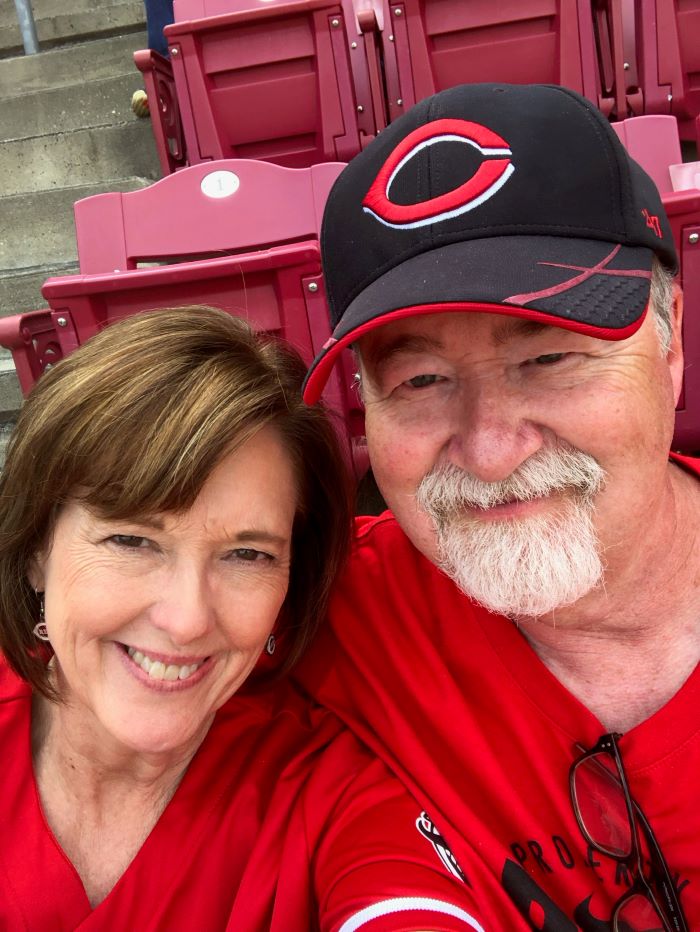Dale Randall takes his health seriously. His father and brother experienced heart attacks at ages 49 and 52. And, one of his sisters needed bypass surgery. So, Dale knows to listen to his heart.
When he woke up with chest pain early on the morning of August 18, 2023, Dale sprang to action. “He woke me up about five in the morning and told me that he was having chest pain, and he was scared and that it felt very different than anything he felt before,” said Dale’s wife, Terri Randall.
Dale wasn’t sure what was happening to him, but he knew enough to be concerned. Terri and Dale decided to drive to St. Elizabeth Dearborn Hospital. The hospital was about 25 minutes from their home in Dearborn County in Southeast Indiana.
“I didn’t think either of us really thought he was having a cardiac arrest,” said Terri. “But while we were on the way, he did say to me, if I don’t make it, do you remember how to do CPR?”
A Plan for Prevention
Dale is 65. His family has a history of heart disease. He knew that preparing for a potential heart issue was important and that preparation became more important every year.
In addition to taking care of his health through regular exercise and healthy nutrition, Dale made sure that Terri knew how to respond in the event his heart went into cardiac arrest. “He was constantly reminding me of the steps to take if something were to happen to him,” said Terri.
Although Terri isn’t certified in CPR, she knows how to perform chest compressions, also known as hands-only CPR. Ultimately, her knowledge helped save Dale’s life.
A Close Call
As they neared St. Elizabeth Dearborn Hospital, Terri realized that Dale was not answering her questions. When she glanced at the passenger seat, she found him unconscious.
“We were seven or eight minutes from the hospital,” said Terri. “We were on a rural road.” She didn’t have time to panic. She was determined to keep him alive.
Terri pulled the car over and called 9-1-1. She reclined Dale’s seat. She performed chest compressions on Dale while she remained on the phone with the 9-1-1 operator.
“I’d been doing CPR on him, mostly chest compressions, for about four minutes. I was getting tired. I didn’t know how much longer I could go.”
The deputy sheriff and paramedics arrived. Immediately, they defibrillated Dale and transported him to St. Elizabeth Edgewood Hospital.
“Upon arrival, he was shocked a few times and intubated,” said Dr. Saeb Khoury, MD, of St. Elizabeth Edgewood Hospital. “He was unconscious and had decreased blood supply to his brain. He started seizing. He was in critical condition and every minute meant his mortality would increase significantly.”
Dale had a 95% blockage in one artery and a 70% blockage and required two stents. Due to seizures and the amount of time he went without oxygen, Dale was also at risk for brain damage. “At that point, it was very bad,” said Terri. “I was thinking he probably wouldn’t make it.”
A Miraculous Recovery
During the next two days, Dale’s condition was touch-and-go. “He was still not responding to me, and I wondered whether his brain was going to recover,” said Dr. Khoury. “We knew we could probably help his heart but couldn’t be sure what was happening with his brain.”
Then, one day, Dr. Khoury walked past Dale’s hospital room and saw a big smile on Terri’s face. “I went to him, and he was able to thank me,” said Dr. Khoury. “When he was able to look at me and respond to me, that was a very emotional moment for me and his family. Those are the moments that make everything worth it.”
The threat of brain damage was gone. “He made pretty much a full recovery neurologically,” said Terri. “The doctors were amazed by that. And they attribute his recovery, at least partially, to the chest compressions I gave him.”
Dale had faced a 50-70% chance of not surviving, yet he made a full recovery. His care team at St. Elizabeth moved him to intensive care for five days. Since then, he’s been in cardiac rehab three days a week.
A Celebration and A Team Effort
On October 16, 2023, the Lawrenceburg, Indiana City Council held a special award presentation for Dale, Terri, the first responders and the physicians involved in Dale’s care.
“His doctors were there, and we were able to see them again,” said Terri. “We were able to meet and thank everybody who was a part of his care.”
“Teamwork was the most important thing,” said Dr. Khoury. “And everyone deserves credit and thanks. The EMS team who attended to his needs and my team in the hospital, from nursing to technologists to X-ray. They all deserve a hand.”
“The heart surgeons and the cardiologists deserve a lot of credit, but they’re only as good as the state of the patient when they get there,” said Terri. “If it wasn’t for the paramedic first responders, 9-1-1, and even me knowing enough CPR to jump in, I don’t know what would have happened. It wasn’t the best job, but it was enough at the time.”
A Lesson Learned
Terri recommends that everyone learn the basics of CPR. “We had that conversation with all our children,” she said. “And many of our extended family members. This was a wakeup call for us, and for them, too. Go to the doctor. Get checked. Make sure you know CPR. And be realistic about the fact that a cardiac arrest is a very real possibility.
Learning hands-only CPR can help you be prepared in any emergency and can help save the life of a loved one. Find out more by clicking here.

